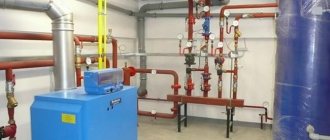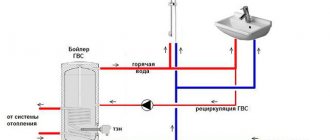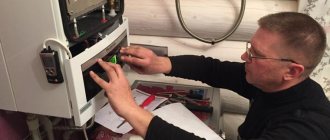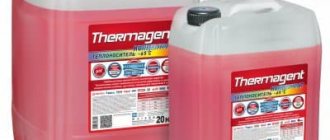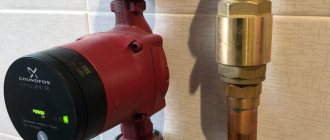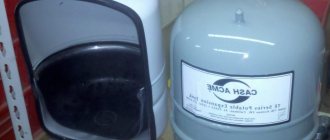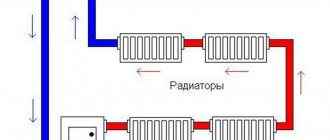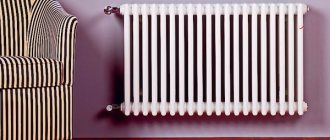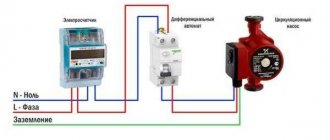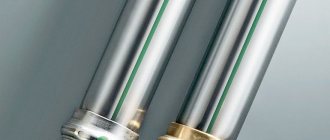Often in an apartment or room of a private house you can hear sounds made by heating communications. It can be noise, and periodic crackling, and even hum, and clicks, and seething. Why heating pipes are knocking depends on the type of problems with the system that appeared during operation or were caused during its installation. The causes and sources of sounds must be eliminated, since they affect the comfortable stay in the apartment or house, and can also provoke serious pipeline accidents.
Knocking in heating pipes and radiators can occur for various reasons, but any of them must be eliminated as soon as possible
Characteristics of noise in heating pipes
When talking about unwanted noise effects in heating system pipes, we should first mention a few words about the difference between noise and sound. If sound waves are characterized by a certain frequency and amplitude, then noise vibrations are characterized by randomness, lack of uniformity and rhythm. The noise level is measured in decibels, and its normal values are up to 30-40 decibels in an apartment and up to 45-55 decibels on the street. Anything that exceeds this level is a deviation from the norm and causes acoustic and psychological discomfort to a person.
Installation of communication systems in a home is carried out in such a way that the noise emanating from them is not felt by residents and falls within the framework of sanitary standards. This also applies to heating pipes, and therefore the appearance of hum, crackling, knocking and other audible noises in them indicates a problem with the heating system.
As an exception, it is worth mentioning the noise that occurs in heating communications during the first start-up of the system. This kind of knocking or crackling noise in heating pipes is not unusual - it is usually associated with pressure drops in the supply and receiving pipelines when water is first supplied to them. Subsequently, as all pipelines of the system are filled with water, the noise in them weakens and then stops completely.
Noise effects resulting from malfunctions in the system can be of various types: hum, crackling, clicking, knocking, bubbling, etc. Their reasons may be related to errors made when installing heating pipes, or may arise during operation (read: “Causes of noise in a heating pipe and solutions”). Noises of different natures have different origins, and therefore identifying the type of noise plays an important role in establishing its causes.
Causes of humming and whistling in heating system pipes
Whistling or humming in heating pipes is quite common, and among the main factors for their occurrence are the following:
- leaks in the heating system;
- the appearance of narrowings in the lumen of the pipes, interfering with normal water circulation;
- the use in some apartments or premises of a residential building of pipes of a smaller diameter than in the rest of the heating communications.
If the reason for the humming pipes is unclear, you should first find out if there are any leaks in the heating system. For this purpose, it is necessary to inspect all apartments and rooms in the house, but if a water leak is not found in them, then also the basement, in which the main plumbing and heating structures are usually located.
Most often, leaks form in fistulas of heating pipeline structures or in valve connections. If such a leak does occur, it is usually not difficult to detect it with careful examination: as a rule, a small stream of water flows from the problem area and a small cloud of hot steam comes out. A stream of water can be detected at some distance from the leak site, and the hum of pipes can sometimes spread over quite significant distances.
If a careful audit reveals that there are no leaks in the system, then another likely cause is a decrease in the flow of pipes in a certain area. The location of this defect is determined by ear by examining the entire heating system. The identified problem area must be replaced. In any case, to repair and restore the damaged area, it would be correct to call a plumber, since this task may not be possible for a non-specialist.
Incorrect burner installation
Quite often, a noise resembling tapping or whistling can be caused by the fact that the gas burner in the boiler was initially incorrectly configured and installed. To check, you will need to compare the level of gas pressure leaving the burner and the recommended indicators in the technical data sheet of the equipment. Entrust this task to the specialist who installed the gas boiler.
Why do you hear clicking, crackling and knocking noises?
The appearance of clicking or crackling noises in the heating system pipes usually indicates that foreign solid particles have appeared inside the communications. The impact of such small particles on the pipe walls is the direct cause of such noise.
As a rule, heating pipes knock and click when the following problems occur:
- wear of some key elements of the system;
- valve valve malfunctions;
- expansion of metal heating pipes under the influence of heat.
In most cases, knocking in the heating pipes of a private house or apartment building can be eliminated by simply draining the clogged water from the heating system and replacing it with clean water. If such flushing does not eliminate noise, then the faulty parts of the system must be replaced. In particular, valve valves are subject to inspection, problems with which are often the cause of such noise.
Another reason for knocking in heating pipes may be the thermal expansion of metal pipeline structures. Usually in this case, the crackling and knocking noises are quiet and intermittent. The expansion of pipes can lead to slight movements and disruption of the fastening of some structural elements, which leads to noise of this kind. To solve this problem, it is necessary to inspect the places where various parts and elements are fixed, and, if necessary, re-fasten them.
Finally, another reason that can lead to clicking and knocking in heating pipes is the so-called water hammer. It occurs when the water circulating in the pipes is instantly shut off by closing the valve, valve or tap. Since the compressibility of water is practically zero, and stopping the water stream cannot happen immediately, for a short time, at the point where the tap is suddenly closed, the pressure can jump by tens of atmospheres. This can lead to malfunctions of valves, valves, threaded connections with clicking or crackling sounds, and even failure of some parts. Therefore, to avoid this, you should not suddenly shut off the flow of liquid circulating in the heating system.
Batteries click, shoot, knock
If a thermostat (thermal valve) is installed in the heating system, this may be the reason. Check if it is positioned correctly. On its body there should be an indicator of the direction of water or coolant flow (see photo). The only option to get rid of the knocking noise in the battery is to remove it and put it in the right direction.
Don't be lazy! Check right now whether the regulators in your apartment or house are installed correctly
Sometimes pipes may knock. This happens when they are located too close to a wall or furniture. Due to strong pressure, the heating system may begin to vibrate. Moreover, this is not always noticeable to the eye. You can solve the problem by wrapping the pipe in insulation or a thin piece of rubber.
Seething water in heating pipes and radiators
Sometimes you have to deal with a problem such as bubbling or gurgling water inside heating lines. This noise occurs due to the appearance of air bubbles inside the water. In addition to noise effects, another undesirable consequence of this problem is a decrease in the temperature of the coolant and the efficiency of the system as a whole.
If seething or gurgling noises occur, the system should be checked for the presence of slopes and distortions, in which a layer of air can form and stagnate. In some cases, to remove air bubbles from the heating system, special air vent valves are installed in the structure on the upper floors. In other cases, it may be necessary to correct distortions and slopes, which requires shutting off and stopping the heating in the entire house.
Murmuring, rustling. Gurgling, sound of pouring water
When such sounds appear, the reasons may be the following:
- The appearance of an air lock;
- Debris in the heating system;
- Bad gaskets.
Airing of the heating system is the most common problem with the appearance of extraneous sounds in the system. Air may appear due to poor quality water or coolant. This is especially true for aluminum radiators. Water with high acidity and alkalinity reacts with the metal and releases gas, which creates a plug.
The second reason for the appearance of air is poor-quality coolant. Over time, it can begin to break down and release oxygen or other gases (sometimes harmful to health).
It is not difficult to detect an air lock in the radiator. It is enough to touch it with your hand from above and below. If the top part of the battery is less heated, air or gas has accumulated there.
If a Mayevsky valve is installed on the batteries, bleed the air from each individual radiator. After that, wait 15-20 minutes and repeat the process. If there is no Mayevsky crane, the process will become more complicated. Read more about this in the article “How to properly bleed air from a heating battery with your own hands.”
Debris in batteries can appear for several reasons:
- Poorly purified water in the heating system;
- Decomposition of the coolant with the release of solid particles;
- Corrosion of the internal walls of radiators;
Small particles of rust and sand rub and hit the inner walls of the batteries, as a result of which an extraneous sound appears, such as rustling or rustling. The only way out is to flush the heating radiators.
Other sources of noise in the heating system
In addition to the reasons mentioned above, the following factors can be sources of various noises in heating communications:
- sudden pressure surges for one technical reason or another;
- non-compliance of the coolant with technological standards;
- noises coming from pumps in the boiler room.
To prevent sudden pressure changes in heating systems of private or apartment buildings, it is recommended to install special control devices. Sometimes the noise can be caused by pumps located in the boiler room, the operation of which can lead to resonance in the water-jet elevator of the heating system. In some cases, the resulting buzzing or crackling can be eliminated by installing a valve between the elevator and the pipe.
To prevent noise in heating pipes, it is recommended to avoid using threaded valves, and instead install ball valves that close the water flow by turning 90°. They are much more reliable for such systems, and their operation is almost unaffected by coolant flows or other mechanical factors inside the structure.
Troubleshooting Methods
In a centralized heating system, only employees of the operating company can eliminate the problem of hum in the riser. You can submit an application by writing an application and submitting it to representatives of the service company.
If there is noise from the autonomous heat supply batteries, you must contact a heating engineer to diagnose the system and troubleshoot the problem.
Having identified errors made during installation, the technicians will be able to localize the cause and eliminate the defects, but for an additional fee.
You can try to localize the cause of the appearance of characteristic sounds yourself. To do this, follow this technique:
- Observe the frequency of sound occurrence.
- Try to determine the dependence (pressure surges in the system, temperature increases).
- With independent heating, where the boiler may be the suspected culprit, make sure that the noise comes from the unit itself and not from elements associated with it.
Diagnosis of fastening elements is carried out through tactile perception. If, in addition to noise, you feel strong vibration, install additional fasteners.
To get rid of the air lock, stop the autonomous heating supply. When the temperature drops to +25-30°C, open the Mayevsky tap slightly, waiting until the system gradually fills. The air pocket will disappear after 1-2 minutes, leaving the pipe along with the coolant. After that, start the system and listen: if the cause is eliminated, the effect will no longer occur.
This process is clearly shown in the video:
Having determined that the cause of the noise is the system being clogged with debris, you can eliminate the problem by cleaning it. To do this, you should first check the condition of the mesh filter, and then clean the system itself using one of two methods:
- Chemical - involves treating the internal walls of the equipment using special reagents that decompose the blockage into small fractions. After this, the remaining debris dissolved in water is easily washed away from the mains.
- Hydrodynamic - limescale and debris are removed from the battery and pipes under the influence of strong water pressure.
Often the source of noise is faulty components of the heating system, for example, a drain valve or an air vent. In such a situation, it is necessary to replace them and reinstall them.
If the problem is the pressure drop in the circuit, you can solve the problem by installing a regulator or a special washer in front of the elevator nozzle, which can be purchased at plumbing supply stores
The characteristic clicks that occur when the metal elements of the line move involuntarily when heated are quite easy to remove. It is enough just to place rubber gaskets between the battery and its mount.
If the difference in pipe cross-sections is not taken into account during installation, noise can be eliminated by balancing the cross-sectional diameters of the water supply elements. This will allow the liquid to circulate freely throughout the system.
If the cause of the noise is improper operation of the boiler or pump, the issue should be approached comprehensively. It is necessary to check the operation of the units through a complete diagnosis, which is almost impossible to carry out at home without the use of special equipment. It is better to entrust this work to professional repairmen.
Knocking in boilers and pumps
Boiler equipment used to equip heating systems can operate on various types of gaseous, liquid or solid fuel, or also on electricity. However, the operation of boilers of any type may be accompanied by certain side processes, which often affect the heating system and can cause noise in it.
In particular, wood or coal solid fuel can lead to clogging of the chimney with a decrease in draft force. The operation of boiler houses using liquid diesel fuel may be accompanied by incomplete combustion and accumulation of soot. All this often leads to noise and humming in heating communications, and requires measures to eliminate these problems.
Noise may also appear due to malfunctions of pumps, valves or other devices and mechanisms located in the boiler room or basement. The solution to the problem in such situations is to repair faulty elements or replace them.
In general, any specific situation with the occurrence of noise in the heating system requires an individual approach, and there cannot be universal methods here. In some cases, identifying and eliminating faults on your own can be very difficult, and in this situation, the only way out of the situation is to contact qualified specialists.

